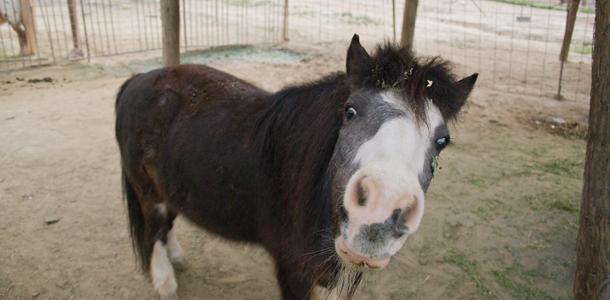Lois Anderson first saw a miniature horse in 1971 on The Johnny Carson Show. “Oh my gosh,” she thought. “I gotta have one.”
It took her two years to find a breeder. She then went to buy a stallion from Kentucky and three mares from Georgia. Today, Anderson has 61 miniature horses, or minis, at Tanglewood Farms, a full-service stable that trains, boards, and sells minis.
Along with her sister, Lora Bozarth, and her brother-in-law, Chris Bozarth, Anderson manages the minis 14 hours a day, seven days a week.
A typical day at Tanglewood begins at 4 a.m. They train and feed them alfalfa hay at particular times of the day.
They even put a blanket around horses that don’t have their natural hair to protect them from the weather. At 74 years old, Anderson acknowledges that the work is difficult, but she thinks it’s worth it.
“It’s like having a furry kid,” she said jokingly. “They’re very affectionate, and they’re very loyal little things. Trust me, we get a lot out of them.”
She described her relationship with the minis as close.
“We’re right there when the foals are born. We do what is called imprinting, which is a bonding process between humans and babies, so they become ‘people-lized.’ They’re very compliant,” she said.
However, she emphasized that minis are still horses.
“You can’t treat them like little dogs, but these horses really have sweet dispositions,” she said.
The youngest minis at Tanglewood Farms are 9 to 10 months old. The oldest one is PJ, which is turning 37 in April, exceeding the typical life span of 30 years old.
“He worked very well all his life, so he deserves a good retirement,” she said. “We are going to take care of him until he dies.”
In 1989, PJ along with other minis were with Lois at the Rose Parade, but she thought the experience was a disaster.
“We had to be there at 1 o’clock in the morning. We almost froze to death,” she recalled. “It didn’t make the horses all that happy. We did it once. That was enough.”
The cost to purchase minis varies. Lois said the horses have gone as far as New York and Hawaii, preferring to sell them at around 2 years old.
”People buy horses and don’t do anything with them. We like to sell trained horses, so that they’ll have homes for the rest of their lives. People get tired of one that just eats and doesn’t do anything.”
She said that it’s difficult not to get attached with the horses.
“It hurts sometimes when they leave,” she said. “We make darn sure that they go to good homes.”
In some instances, Lois bought some minis back because she didn’t feel that they were going to good homes.
Because of the economy, they are breeding fewer horses than usual this year.
“We’re cutting back just a little bit because the economy’s so bad. We only bred two mares this year. Normally, we breed eight or 10,” she said. “We don’t want to raise so many horses that there aren’t any homes for them. We raise them to train and sell.”
Of the 61 miniature horses on their property, 12 of them are boarders, which are minis owned by other people but live on Tanglewood. One of the boarders is actually part pony, which is different from a miniature horse. Ponies developed out of naturally harsh conditions.
They were horses that got smaller and smaller because conditions were so severe that the smaller ones survived and the bigger ones did not. Minis, on the other hand, are man-made, bred down from full-sized horses. They are also smaller than ponies.
“Ponies can be a little bit ornery sometimes. Miniatures are very smart little things. They do things that you wouldn’t believe,” she said. “They grow on you. They’re wonderful companion animals.”
They have even rescued minis from different states that looked like “concentration camp horses.”
According to Lois, horses have excellent memories.
“They remember all the good that happens to them, but they also remember all the bad that happens to them,” she said. “It makes them valuable as working animals.”
The minis draw a lot of attention when they take them out with carriages, especially on the highway.
”We get a lot of positive remarks when we’re out driving. People take pictures,” she said. “We handle them, so they’re well-trained. They trust their people, so if you tell them it’s OK, it’s all right.”
All of the minis at Tanglewood Farms are of the American Miniature horse breed, which is the result of highly selective breeding, dating back to the 17th century when minis served the ruling classes and kings in Europe.
Today, minis offer an affectionate alternative to its larger counterpart.


